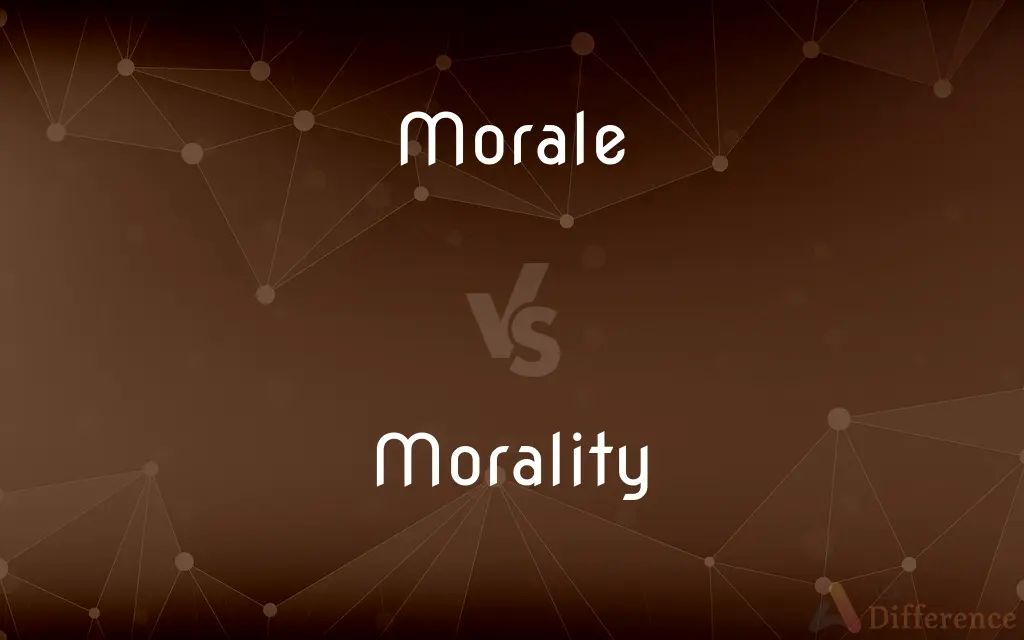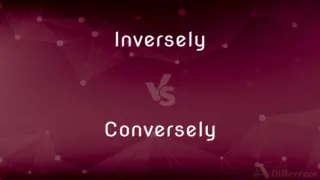Morale vs. Morality — What's the Difference?
By Tayyaba Rehman & Urooj Arif — Updated on April 21, 2024
Morale refers to the confidence, enthusiasm, and discipline of a person or group, while morality concerns the principles of right and wrong behavior and the goodness or badness of human character.

Difference Between Morale and Morality
Table of Contents
ADVERTISEMENT
Key Differences
Morale is typically understood as the collective emotional and mental condition regarding the confidence, enthusiasm, and discipline of a person or group, especially in the face of challenges. On the other hand, morality pertains to the principles or standards concerning right and wrong or good and bad behavior and character, often influenced by cultural and personal beliefs.
In a workplace, morale might be influenced by factors like job satisfaction, team dynamics, and management practices, reflecting how motivated and emotionally healthy employees are. Whereas, morality in the same setting would involve ethical practices, integrity in dealings, and adherence to organizational and societal ethical standards, focusing on the character and actions of the individuals and the organization as a whole.
Morale can fluctuate frequently based on immediate circumstances such as successes or failures, changes in leadership, or the work environment. Conversely, morality is generally more stable, deeply rooted in personal values and societal norms, and evolves more gradually over time through shifts in personal growth and cultural changes.
High morale in a team or organization can lead to increased productivity, better cooperation among members, and higher overall satisfaction. In contrast, strong moral principles can lead to greater trust, transparency, and ethical behavior within the team, impacting long-term relationships and reputation.
The relationship between morale and morality can be interdependent. A morally sound environment can enhance morale by creating a sense of fairness and respect among team members. Conversely, high morale can foster an environment where ethical behaviors are valued and more likely to be upheld.
ADVERTISEMENT
Comparison Chart
Definition
Emotional and mental state of confidence and enthusiasm
Principles regarding right and wrong behavior
Key Influence
Work environment, leadership, team dynamics
Cultural, personal beliefs, ethical standards
Stability
Can change rapidly based on circumstances
Generally stable, evolves with cultural shifts
Impact in Workplace
Affects productivity, cooperation, and satisfaction
Influences trust, transparency, ethical behavior
Relationship
Can be enhanced by ethical environments
Promoted in high morale settings
Compare with Definitions
Morale
Often associated with collective spirit in challenging situations.
Despite the setbacks, the morale of the troops remained high.
Morality
A system of values and principles that determines right and wrong behavior.
His strong sense of morality prevents him from cheating, even when the opportunity arises.
Morale
The emotional and mental state of a group or individual as it relates to discipline, confidence, and enthusiasm.
The team's morale boosted significantly after a successful project completion.
Morality
Affects legal and social norms within societies.
Laws about theft are based on the moral principle that stealing is wrong.
Morale
Influenced by leadership, communication, and achievements.
Effective communication from management significantly improves employee morale.
Morality
Involves judgments about the goodness or badness of actions and character.
Many consider volunteering a moral obligation to help those in need.
Morale
Reflects the general attitude and satisfaction within a group.
Company outings and team-building activities are great for boosting morale.
Morality
Often rooted in cultural, religious, or philosophical beliefs.
Different cultures have diverse views on morality, especially concerning issues like marriage and justice.
Morale
Subject to fluctuations due to external and internal factors.
News of impending layoffs has negatively affected the staff's morale.
Morality
Guides behavior and choices based on ethical considerations.
Morality influenced her decision to return the lost wallet with all its contents intact.
Morale
Morale, also known as esprit de corps (French pronunciation: [ɛspʀi də kɔʀ]), is the capacity of a group's members to maintain belief in an institution or goal, particularly in the face of opposition or hardship. Morale is often referenced by authority figures as a generic value judgment of the willpower, obedience, and self-discipline of a group tasked with performing duties assigned by a superior.
Morality
Morality (from Latin: moralitas, lit. 'manner, character, proper behavior') is the differentiation of intentions, decisions and actions between those that are distinguished as proper (right) and those that are improper (wrong). Morality can be a body of standards or principles derived from a code of conduct from a particular philosophy, religion or culture, or it can derive from a standard that a person believes should be universal.
Morale
The state of the spirits of a person or group as exhibited by confidence, cheerfulness, discipline, and willingness to perform assigned tasks
The staff's morale increased when everyone was given a day off with pay.
Morality
The quality of being in accord with standards of right or good conduct
Questioned the morality of my actions.
Morale
The capacity of people to maintain belief in an institution or a goal, or even in oneself and others.
After the layoffs, morale was at an all time low; the staff were so dispirited nothing was getting done.
Morale is an important quality in soldiers. With good morale they'll charge into a hail of bullets; without it they won't even cross a street.
A morale-boosting exercise
Morality
A system or collection of ideas of right and wrong conduct
Religious morality.
Christian morality.
Morale
The moral condition, or the condition in other respects, so far as it is affected by, or dependent upon, moral considerations, such as zeal, spirit, hope, and confidence; mental state, as of a body of men, an army, and the like.
Morality
Virtuous conduct
Commended his morality.
Morale
A state of individual psychological well-being based upon a sense of confidence and usefulness and purpose
Morality
A rule or lesson in moral conduct
Sermons noted for their moralities.
Morale
The spirit of a group that makes the members want the group to succeed
Morality
(uncountable) Recognition of the distinction between good and evil or between right and wrong; respect for and obedience to the rules of right conduct; the mental disposition or characteristic of behaving in a manner intended to produce morally good results.
Morality
(countable) A set of social rules, customs, traditions, beliefs, or practices which specify proper, acceptable forms of conduct.
Morality
(countable) A set of personal guiding principles for conduct or a general notion of how to behave, whether respectable or not.
Morality
A lesson or pronouncement which contains advice about proper behavior.
Morality
(countable) A morality play.
Morality
Moral philosophy, the branch of philosophy which studies the grounds and nature of rightness, wrongness, good, and evil.
Morality
A particular theory concerning the grounds and nature of rightness, wrongness, good, and evil.
Morality
The relation of conformity or nonconformity to the moral standard or rule; quality of an intention, a character, an action, a principle, or a sentiment, when tried by the standard of right.
The morality of an action is founded in the freedom of that principle, by virtue of which it is in the agent's power, having all things ready and requisite to the performance of an action, either to perform or not perform it.
Morality
The quality of an action which renders it good; the conformity of an act to the accepted standard of right.
Of moralitee he was the flower.
I am bold to think that morality is capable of demonstration.
Morality
The doctrines or rules of moral duties, or the duties of men in their social character; ethics.
The end of morality is to procure the affections to obey reason, and not to invade it.
The system of morality to be gathered out of . . . ancient sages falls very short of that delivered in the gospel.
Morality
The practice of the moral duties; rectitude of life; conformity to the standard of right; virtue; as, we often admire the politeness of men whose morality we question.
Morality
A kind of allegorical play, so termed because it consisted of discourses in praise of morality between actors representing such characters as Charity, Faith, Death, Vice, etc. Such plays were occasionally exhibited as late as the reign of Henry VIII.
Morality
Intent; meaning; moral.
Taketh the morality thereof, good men.
Morality
Concern with the distinction between good and evil or right and wrong; right or good conduct
Morality
Motivation based on ideas of right and wrong
Common Curiosities
What are some examples of morality in action?
Actions like honesty, fairness, and compassion in interactions are examples of morality in practice.
What is the main difference between morale and morality?
Morale refers to the collective spirit and emotional state of a group, while morality involves principles determining right and wrong behavior.
How do cultural beliefs influence morality?
Cultural beliefs shape what individuals and societies consider moral, influencing laws, social interactions, and personal behaviors.
Is morality the same across all cultures?
While basic moral principles like honesty and fairness are common, specific interpretations and practices can vary significantly across different cultures.
How does morale affect a workplace?
High morale typically leads to better productivity, cooperation among employees, and overall job satisfaction.
Can morale exist without good morality?
Morale can exist independently of morality; however, long-term high morale is often sustained by ethical practices and mutual respect.
Can changes in morality impact societal laws?
Yes, as societal views on morality evolve, laws are often updated to reflect these changes, affecting areas like civil rights, justice, and public policy.
What might cause morale to decline in a team?
Factors like poor management, unclear communication, lack of recognition, and unresolved conflicts can lead to a decline in morale.
What role does morality play in leadership?
Strong moral principles in leadership ensure ethical decision-making, inspire trust and respect, and uphold the integrity of the organization.
How can an organization maintain high morale?
Organizations can maintain high morale through consistent and fair management practices, recognizing and rewarding good work, and fostering a supportive and inclusive work environment.
Share Your Discovery

Previous Comparison
Mortal vs. Immortal
Next Comparison
Inversely vs. ConverselyAuthor Spotlight
Written by
Tayyaba RehmanTayyaba Rehman is a distinguished writer, currently serving as a primary contributor to askdifference.com. As a researcher in semantics and etymology, Tayyaba's passion for the complexity of languages and their distinctions has found a perfect home on the platform. Tayyaba delves into the intricacies of language, distinguishing between commonly confused words and phrases, thereby providing clarity for readers worldwide.
Co-written by
Urooj ArifUrooj is a skilled content writer at Ask Difference, known for her exceptional ability to simplify complex topics into engaging and informative content. With a passion for research and a flair for clear, concise writing, she consistently delivers articles that resonate with our diverse audience.













































